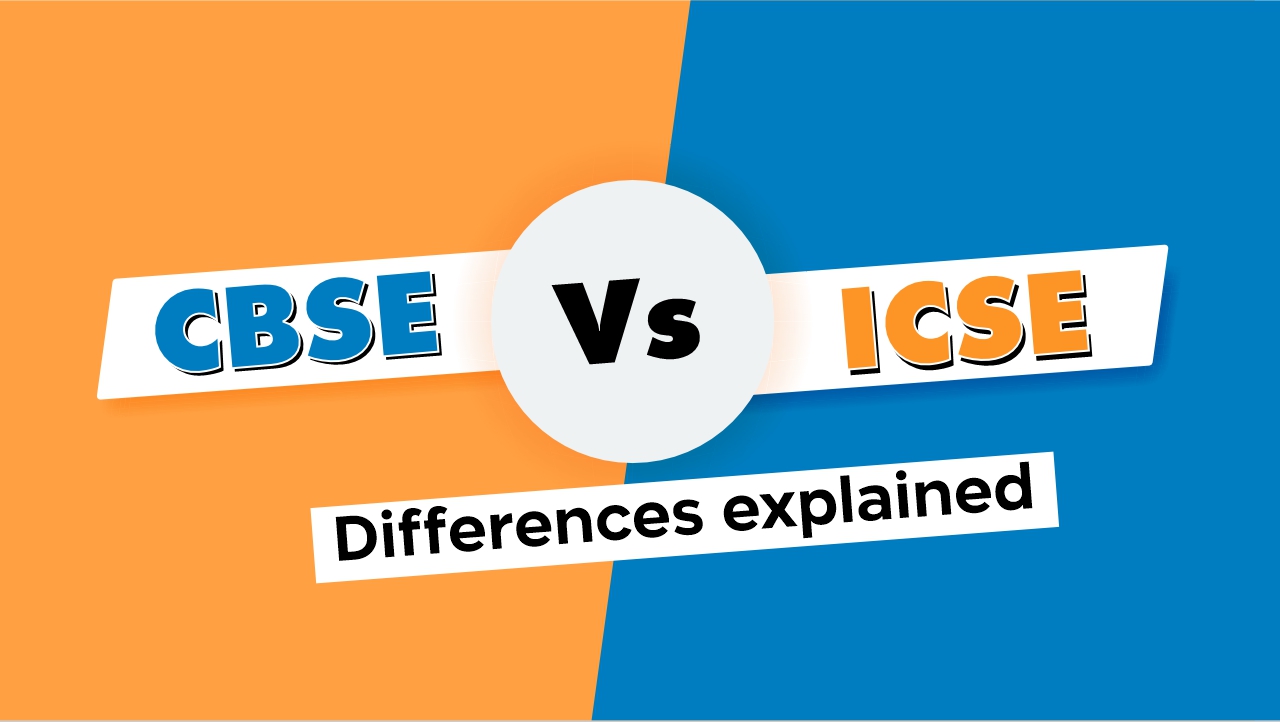Providing children with the best education is the dream of every parent. Selecting the appropriate education board requires significant planning and research. In this comprehensive blog on CBSE vs ICSE, you will learn about the differences associated with these boards, helping you make an informed decision about your child’s education.
About CBSE
CBSE, also known as the Central Board of Secondary Education, oversees both public and private schools. The curriculum promotes the development of logical skills, with a specific focus on science and math. The board organises two types of exams: the All India Secondary School Examination (AISSE) for class 10th and the All India Senior School Certificate Examination (AISSCE) for class 12th.
About ICSE
The Council for the Indian School Certificate Examination (CISCE) conducts the ICSE exam, which stands for Indian Certificate of Secondary Education. CISCE is a private board of school education in India that conducts the ICSE exam for Class 10 students and the ISC exam for Class 12 students.
CBSE vs ICSE: Key Differences to Consider
The following points highlight the difference between CBSE and ICSE, making it easier for parents to make an informed decision about their child’s education:
- Syllabus
The difference between CBSE and ICSE is evident in the structure of their syllabi. ICSE syllabus is detailed and comprehensive, while CBSE adopts a precise and light approach. The curriculum is more systematic and well-organised, facilitating easy understanding. The teaching methodology further sets them apart. ICSE emphasises applying theoretical concepts and leans towards real-life ideas for a deeper understanding. Some ICSE schools even offer creative subjects like agriculture, home science, arts, and cooking. On the other hand, CBSE offers a compact syllabus with fewer subjects.
- Medium of Instruction
CBSE has no language preference, whereas ICSE places greater importance on the English language. One of the notable benefits of ICSE over CBSE lies in its dedication to literature and language skills, which contribute significantly to a child’s overall skill and personality development.
- Grading System
CBSE adopts an alphabetical grading system (A1, A2, B1, B2, C1, C2, D, E1, E2), while ICSE uses a numeric system (1–9). A1 in CBSE corresponds to 91–100%, while grades 1 and 2 in ICSE indicate the highest and second-highest percentages, with 8 and 9 signifying failure. The ICSE exam’s grading is more rigorous, whereas CBSE follows a more lenient approach. Determining which board is best between CBSE & ICSE involves considering these grading variations.
- Competitive Edge
When it comes to competitive edge, parents can choose any of the two boards. The reasons for this lie in the distinct advantages of each board.
Given that the CBSE curriculum is based on the board’s recommended syllabus, students may find it simpler to prepare for competitive exams like IIT, NEET, etc. Meanwhile, ICSE adopts an in-depth and analytical approach due to its extensive and complex syllabus, which prepares students organically for any national or international competitive exam.
- Difficulty Level
The level of difficulty varies between CBSE & ICSE due to differences in curriculum, syllabus, and assessment patterns. ICSE is considered more challenging because of its highly concept-based approach, numerous internal evaluations, and practical application of concepts in exams. In contrast, CBSE is relatively more straightforward, emphasising a simple, concise curriculum and a lenient grading system. The level of difficulty primarily depends on your child’s capacity to learn and adjust to the particular educational demands.
- Ease of Transfer
The CBSE examination is widely favoured throughout India, simplifying admission processes due to its extensive affiliation with Indian schools and universities. ICSE board schools are not that common and are fewer in number. Additionally, transferring between boards is not permitted by the ICSE Board for students entering classes 10th and 12th. To qualify for admission to these classes, students must have completed their studies with the ICSE in the 9th and 11th standards, respectively.
- Acceptance
In comparing CBSE vs ICSE, it is important to understand that colleges and institutions worldwide accept both exam results. But it is observed that ICSE holds more significance for students seeking admission to foreign universities.
Parents should note that both CBSE & ICSE are designed to facilitate the education of students in India following a curriculum that is suitable for various national competitive exams. If getting admissions into foreign universities is one of your long-term plans for your children, it is advisable that you go to schools that follow the International Baccalaureate (IB) board curriculum.
While comparing the two boards, rather than solely focusing on the curriculum, consider your child’s strengths to make an informed decision about their educational path.


Don’t miss out on the fresh content and engaging conversations. Become a part of our community today!


Although the CBSE board is also more widely accepted,, students with an ICSE credential typically receive more opportunities abroad.
Really important
Thank you for sharing In depth this Important Topic in detail. The difference & importance of both the Indian Board.. It’s really helpful on time when ur child complete 5th grade… Specially when they are applying for any Entrance Exams..Many people are having wrong impression are knowledge.. This Article give better impact and clear vision to choose the right Board for their kids on right time.. 🙂